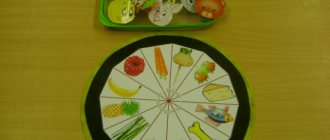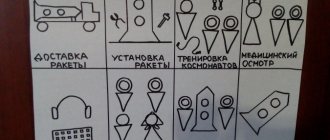Business game for parents “I myself!”
1 ball: Independence is a valuable quality that a person needs in life. Can a small child be independent?
2 ball: By nature, children are very active and very often they strive to perform various actions on their own. But due to lack of time or uncertainty in the child’s strengths, we strive to do everything for him ourselves. How do you think? Are we really helping the child?
Teacher's comments:
In principle, fostering independence is teaching a child to the idea that for him - like everyone else in the house - there are certain rules and he must comply with these rules. The parent, who at first provided one hundred percent of the baby’s life activity, must gradually, step by step, begin to dose out his help to the child.
The desire to do everything yourself is an organic sign of growing up, a sign of the awakening human psyche. Basic skills of independence are developed at approximately three years of age. And the first skill that you should pay attention to is independence in eating. As soon as you - calmly, unobtrusively, without getting irritated by the porridge falling on the table - show how to hold the spoon correctly, over time the child will begin to be able to bring it to his mouth full. If you miss the moment here, you will make the task easier for yourself - and the child will very quickly get used to the fact that adults are constantly feeding him.
It is clear that at two and a half years old, your daughter or son still cannot take off a turtleneck over her head or pull on tight tights. But they are quite capable of fastening Velcro on sneakers and sandals (while wearing the “correct” feet!) - as well as wrapping a scarf around their neck. So don’t do this for them, pretend that you are already dressed and going out, and your child is still wearing one shoe? I assure you, this will work and soon everyone will always be ready on time. Then let the children put on their jeans themselves, learn how to zip a jacket, and so on.
An important point in nurturing a child’s independence is his responsibility for what is most valuable to him – toys. Let your three-year-old understand that order in his toys is his contribution to the overall order in the house, and let him, say, before guests arrive, once again check that everything is in place.
Children can also be taught responsibility and independence through play. For example:
Game: "Good hands." This game is very useful for children - “bullies”.
You can play this game at home. Place the “naughty” pens on a sheet of paper. When coloring them with your child, draw them eyes and a smiling mouth. Tell your child that hands are very kind, good, you can stroke someone with them, do something useful, etc. And then invite the child to agree with the hands so that they do only good deeds for, for example, half an hour. After half an hour, praise the child’s hands and stroke them. Then increase the time to an hour, a day, a week, etc. The baby is pleased to hear praise and receive mother’s affection. And soon your child will stop rowdying.
Parent meeting in the form of a business game in kindergarten in the preparatory group
Scenario for a parent meeting - a business game for parents of preschool children on the topic “Who is a good parent?”
Description of the material: I offer you a scenario for a parent meeting in a pre-school group in the form of a business game “Who is a good parent?” This material will be useful for educators, preschool teachers, and students. The material is aimed at increasing professional knowledge on working with parents and increasing parental competence. Explanatory note Parents are a person’s closest relatives, forming the basis of his family. Being a parent is not that easy. Being a parent is a precious experience and one of the most rewarding things you can do in your life. Parents raise a child from birth, take care of his material and spiritual well-being until he reaches adulthood, which imposes a number of ethical and social obligations on an adult son or daughter in relation to his parents. No matter how old your child is, you can never consider your task completed. To be a good mother or father, you need to know how to make your child feel valued and loved while teaching him the difference between right and wrong. The most important thing is to create an environment in which children can thrive and grow into confident, independent and caring adults. How important it is for each of us that the people around us understand us. They understood our words, gestures, facial expressions, our views. But unfortunately, this does not always work out in real life. What is it like for children? Many of the difficulties of family upbringing are directly related to misunderstanding, to the inability of parents to enter into the world of things and relationships of the child, into the world of childhood. We really want our child to thank us years later for having us, parents, on this earth. But how to wait for these words, how to make a child want to see us nearby at any age, in any condition. Goal: to help parents cope with the task of increasing their parental competence and raising the pedagogical cultural level. Objectives: - to help parents become enlightened, aware of their value orientations, attitudes and expectations, their parental feelings and positions, able to control and correct those that may prevent the child from growing into a harmonious personality; - encourage the desire to analyze your educational role in relation to your children; - help parents choose methods and means of raising their own children; — establish partnerships between the teacher, children and parents; - provide an opportunity for parents to share their experiences in raising children; — show activity, attentiveness, sensitivity, ingenuity, and most importantly the desire to become the most active participant in the business game. Form of implementation: in the form of a business game Participants: parents of students, teacher, educational psychologist Preliminary work: prepare the hall, ventilate the room, arrange chairs according to the number of people present, draw a picture with the children in advance “What gift do I expect from Santa Claus for the New Year 2020? Material: one medium size ball;
sheets of paper in A-4 format, 2-3 pieces, with drawn daisies; 3 glasses of clean water; gouache: black, golden; 2 brushes; markers; sheets of paper with life situations; sheets of paper with proverbs, tables, chairs. Progress of the business game
(Greetings from the teacher to all participants in the business game) Educator: Our parent meeting will be held in the form of a business game. We will work very fruitfully and efficiently. Let's discuss the following rules: 1) Everyone has the right to speak on the topic of conversation and be heard. 2) We don’t have spectators, everyone gets involved in the work. 3) We are good friends, well-mannered people, we know how to listen and hear each other. Educator: Do we accept the rules? (answers from those present) Let's get to work. 1. Speech by the teacher on the topic “Who is a good parent?” To assess how successful you and I are as parents, what we need to do to make the profession of being a parent a joy for everyone. Do you need to understand what determines the quality of family education? First of all, the level of pedagogical culture of the child’s parents. Pedagogical culture is a component of a person’s general culture, which reflects the accumulated and continuously enriched experience of raising children in the family accumulated by previous generations. The pedagogical culture of parents serves as the basis for the educational activities of parents. The success and effectiveness of raising children depends on the level of pedagogical culture of parents: - understanding and awareness of responsibility for raising children - knowledge about the development, upbringing, education of children; — practical skills in organizing the life and activities of children in the family, carrying out educational activities; — productive communication with other educational institutions (preschool, school). The direct function of the family as a social institution is to teach the child the social experience that humanity has accumulated, the culture of the country, its moral standards, and the traditions of the people. But all this is impossible without systematic education of parents. We are all different: we have different education, different characters, different views on life, different destinies, but there is one thing that unites us - our children. How and what you need to do to make your child become your happiness! You just need to love, understand, support, sympathize, and forgive the child. The biggest deficit that our children experience is a deficit of affection. Parents do not find time, forget, and maybe even hesitate to caress their child just like that, obeying some inner impulse, the fear of spoiling children, especially boys, forces the father or mother to be excessively harsh with children. Parents, who form the basis of the family, are the cradle of a person’s spiritual birth. The variety of relationships between its members, the spontaneity of the feelings they have for each other, the abundance of different forms of manifestation of these feelings, a lively reaction to the slightest details of the child’s behavior - all this creates a favorable environment for the emotional and moral formation of the individual. 2. Game “Joyful Ball” Goal:
to help parents reduce anxiety and stimulate emotionality.
Rules:
participants all stand in a circle.
The teacher says: “I am in a very good and joyful mood today, and I would like to share with you. Stretch your arms forward, turn them palms up, and our “ball of joy” will roll along them, giving you my joyful mood.” You cannot drop the ball or throw it, it must roll. 3. Exchange of views on “Life situations” Goal:
to help parents see the problems of adults in raising children and learn from the examples of others, avoid mistakes, and find the right path in different life situations.
Parents sit on chairs in a circle. Under the chairs, the teacher places 3 pieces of paper under different chairs in advance. Situations 1, 2, 3 are written on the pieces of paper. Parents take turns reading situational moments, first they tell their point of view, how they would act in this situation, and then they all discuss this situation together and come to the correct opinion. At the end, the teacher summarizes what has been said, adding that in order to scientifically build family pedagogy, you need to know the age-related psychological characteristics of your children. Then you will be able to compare your child’s capabilities and achievements with age requirements, anticipate them, prepare children for them, and take into account the characteristics and difficulties of each age stage. 1 situation. “Coming home, the child tells his parents that today he was unable to draw a picture about winter. During a physical education class, I failed to perform a balance exercise while walking on a bench. No one wanted to play during the walk. Grisha didn’t give me his toy to play with” situation 2. “Children in kindergarten often complain about the boy Grisha; sometimes he offends, sometimes takes away, sometimes pushes, sometimes shouts. One evening, a teacher decided to talk to a parent, in the absence of other parents and children, to which the parent replied: “Our child is very good!” 3 situation. “You can often hear from parents: “I know what my child needs! He will do this, but he won’t! We parents will decide for ourselves what is best for him!” Generalization of the teacher: Such parents build the child’s life according to their own model, and then they are surprised that this life was not a success. They consider themselves the rulers of the child's future life. Very often they program the belief system, even the profession, of their children, thereby suppressing their personality and the opportunity to more fully realize their abilities! As soon as a child asserts himself as an individual, a problem arises. And why? Because many parents are not able to tell themselves that this is my child, but he has his own values, and my duty is to help him realize them. Parents see their task differently: “I will make his life such that he is happy!” In childhood, everything is laid that will later make up the essence of a person, his personality. A wise parent and teacher is like an architect who, when designing a new building, has a good idea of not only the facade, but also the entire interior. What adults invest in a child from early childhood is stored in him, like in a piggy bank, for many years, melting into character traits, personality traits, forming into habits and skills. But sometimes we, not knowing the future of our child and not knowing his present, build a too rough scheme, an ideal model, prepare for him in our ambitious dreams and bright hopes roles that we once could not cope with ourselves. 4. Game “Guess what gift your child wants from Santa Claus for the New Year 2020?” Goal:
to help parents understand their children’s wishes for the New Year.
How frank children are with their parents and how aware parents are of their children's wishes. Rules:
every parent talks about their children’s cherished wishes for the New Year.
At the end, the teacher introduces the children to the drawings drawn earlier about their cherished desires and the parents compare their answers with the drawings. 5. Reading proverbs “About family” Purpose:
to help choose the right proverbs according to their meaning.
At the right time, “find the right words” for your child. Rules:
parents read proverbs, choosing the right ones according to their meaning, about the family, which are prepared in advance on pieces of paper.
- When the sun is warm, when mother is good - He who honors his mother and father never perishes - There is no dearer friend than his own mother - Feel sorry for your father and mother, you won’t find others - Father and mother have warmth in their bosom and in the cold - The happiness of parents -honesty and hard work of children Generalization of the educator: the family is the environment in which the conditions for his physical, mental, emotional and intellectual development are formed. The family atmosphere influences the formation of the child’s mental makeup and determines the development of feelings and thinking. 6. Game “Flower” Purpose:
to highlight the positive aspects of the child, to encourage parents to speak kind words to their child more often.
Rules:
Three parents, if desired, each fill out their own daisy flower.
Write your child's name in the center of the flower. On the leaves of the flower are the positive qualities of a child, and on the petals are affectionate words. Generalization from the teacher: Popular wisdom says: “the sweetest sound for a person is his name.” If you want to attract a child’s attention to yourself and set him up for communication, then you should address him by name. What do you name your child? Thus, the child always wants to hear kind words or “I love you” from his closest people. It is these words that nourish the entire existence and development of the child’s personality. Renowned family therapist Virginia Satir recommends hugging your child several times a day. And he believes that 4 hugs are absolutely necessary for everyone simply for survival, and for good health you need at least 8 hugs a day! For a child to develop intellectually - 12 times a day! The child should know that his parents will always understand and accept him, no matter what happens to him, and no matter what he is like. This nourishes him emotionally, helping him develop psychologically. If he does not receive the proper signs, then behavioral deviations and even neuropsychic diseases appear. Every child needs hugs in order to feel their tenderness. It is necessary to treat your child humanely (respectfully, carefully, attentively, affably, sincerely, touchingly). 7. Exercise “Glass of water” Purpose:
using a metaphor, draw the attention of parents to the need for a humane attitude towards raising a child.
Rules:
There are three glasses of clean water on the table.
Let’s imagine that each of them is a child born with pure feelings, whose views on the world and ideas about it have not yet been formed or are just beginning to form. Let's take the first glass and leave it unchanged. What's going on in this glass? We don't know for sure, something can get into it without our attention. Throw a piece of black paint into the second glass and stir it. What happened in the glass? The water became dirty and dark. Add gold powder to the third glass. What's going on in this glass? The water sparkled with golden sparkles. Generalization from an educational psychologist: This is what happens in raising a child. When we leave it without proper attention and supervision, it can develop further. But in what direction? When we put only “dirt” into a child - shouting, criticism, dissatisfaction with him, insults and humiliation, then the child begins to respond to us in the same way. When we invest attention, love, and respect into a child, then the child responds to us with goodwill and the normal harmonious development of his personality. 8. Memo for parents - In order to develop the ability to be a good father or mother, you need to really want it and love your child just because you have him. — In order for your child to grow up to be a healthy, happy and self-confident person, you must answer the following question: Will what I want for him always be good for him? - Be extremely frank with your child on all issues of his present and future, do not paint him rosy horizons that may not come true. - Make sure your child knows what you want from him. — From early childhood, teach your child to understand the words “can”, “cannot”, “must”. - Remember! The child must understand very early that there are things that absolutely cannot be done, because this will be followed by mandatory punishment. - Tell us about yourself, your childhood, your desires and interests, plans and actions, what worked and what didn’t work. — Tell the truth about yourself, don’t paint yourself with rosy colors. — Develop in your child responsibility for his deeds and actions, do not shift them onto the shoulders of others. - Let your child understand that you need him, that he is not a burden, but a joy, no matter how difficult it is financially and morally in your life. - Know how to listen to your child. - Teach him to live according to the rules and laws, influencing by your own example. -Know how to forgive and ask for forgiveness from your child! The teacher thanks all participants in the business game for their active participation and wishes everyone success in raising children.
We recommend watching:
Parent meeting in the preparatory group. Notes Notes of the parent meeting in the preparatory group Parent meeting in the preparatory group. Psychological readiness for school Parent meeting - entertainment in a school preparatory group
Similar articles:
Parent meeting in the preparatory group “Soon to school.” Beginning of the year
Business game with parents at a parent meeting in kindergarten
Parent meeting in the preparatory group. Games with parents
Parent meeting in the preparatory group. Hyperactive child
Holiday "Family Traditions" in the senior group. Scenario




